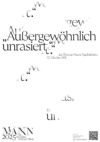"A strong aversion to doing anything in the afternoon" was one of the most popular tweets on your account. What does that say about Twitter users from two years ago?
I think it stems from surprise. On one hand, there’s this enduring idea we have about poets and intellectuals – this notion of genius that just won’t die and has even gained traction in recent years. Genius is totally present in the media again. Ask people on the street, "What is Thomas Mann known for?" – they’ll all say: for his endless discipline. It’s one of the most successful marketing strategies in German literary history.
Then there’s also the relatability factor. Literary scholar Johannes Franzen would probably call it the "late revenge" of readers who had to endure Thomas Mann as assigned reading in school – that pent-up feeling of humiliation where you didn’t understand why this was considered high culture.
And of course, it was just a killer line. Many said Mann would’ve been an amazing Twitter user. But he wouldn’t have written just one sentence – that’s not how his diaries work. There’s no entry with just one sentence.
How did the idea for "Thomas Mann Daily" come about? What was your goal with it?
It was more of an impulse. I can’t really reconstruct the whole process anymore – it just came out of a whim because I didn’t want to be alone with reading the diaries anymore. Back then, I talked a lot about them with my colleagues at Humboldt University and read them extensively. I kept telling people about the absurd stuff in there. The reactions were always great – I love making people laugh through literature. After two or three tweets, it started working well, so I just kept going.
What happened next?
The people I interacted with on Twitter back then had a funny way of engaging with it right away. They immediately commented that they felt the same way as Mann did. This odd parasocial relationship with the account was there from the beginning. It was fun and reinforced my interpretation of the quotes. Sure, tons of people have read these diaries, but apparently no one really noticed how bizarre some of it is – or at least no one thought to highlight it.
The quotes reveal a very human, everyday side of Thomas Mann. What’s so appealing about experiencing the daily challenges and insecurities of such a highly esteemed writer?
The appeal lies partly in breaking away from the typical image we have – this idea of intellectual giants and how literature is created. That’s also something I’m academically interested in: how the process of producing literature was commented on and understood by writers themselves at different times. The other appeal is simply the surprise that you might have something in common with Thomas Mann. He often seems inhuman and unapproachable. There’s this vague image of him floating around in Germany. For many people, it leads to a mix of surprise, schadenfreude, and an odd sense of identification that you wouldn’t have thought possible before.
What purpose did Thomas Mann's diaries serve for him?
He called them "daily accounts" – I think they were a kind of evening Protestant cleansing ritual for him. He had quite a complex emotional landscape but didn’t feel like writing extensively later in the day. The logic was, as Fritz Raddatz put it: first my work, my quirks, then the world. In his early diaries from 1918 to '21, there’s more reflection on politics; later on, it becomes this telegram style. Heinz Strunk mimicked this brilliantly in his INTIMSCHATULLE [Editor’s note: a publicly shared diary published in TITANIC magazine] – things like "Excruciating desk work; fried herring for lunch." It’s incredibly funny because it’s all about punchline humor; Thomas Mann himself didn’t see it that way. For him, it was simply a ritual to close out his day and get back on schedule the next morning.
About Felix Lindner
Felix Lindner (b. 1991) is a literary and cultural scholar as well as an editor at ZEIT ONLINE. Previously, he worked as a research associate at Humboldt University of Berlin and as a freelance editor and proofreader for publishers such as Ullstein, Hanser, and Rowohlt. He gained recognition through the Twitter account "Thomas Mann Daily" (2022–2023), where he shared humorous quotes from the diaries of the author. His book Mit Thomas Mann durch das Jahr (S. Fischer, 2024) is based on this concept. Lindner's research focuses on questions of corporeality, dietetics, and the everyday practice of literary writing.
Image: Mirko Lux

How did you find these gems?
You really have to read the diaries in their entirety. I think that’s why the oddities stood out to me. In German studies, people often only look at specific dates, dipping in here and there. But to understand the peculiarities, you need to read them completely. It was fascinating as they were gradually published over time. There was a lot of coverage in the cultural sections of newspapers. In the book’s afterword, I tried to reconstruct how the media followed the publication process from the late 1970s to 1995. Can I tell you a bit about that?
Sure!
The first excerpts from Mann’s diaries from 1933/34 were released in 1977 – coincidentally during the week of the Landshut hijacking and Schleyer kidnapping. In Der Spiegel, where the cover featured “Atom” and “Terror,” these diary excerpts were tucked away somewhere inside. The magazine wrote, “The editor deemed it necessary to justify their publication,” which shows that people had bigger concerns at the time – there wasn’t much discussion about it. Every two years, new volumes came out, and something changed over time. Marcel Reich-Ranicki eventually spoke of a “cult following” eagerly awaiting each new volume.
A cult following for diaries?
Well, I don’t think it existed in any significant size. Reich-Ranicki probably exaggerated a bit. But there was definitely interest in this kind of intimate journal. Major outlets like Die Zeit and Der Spiegel wrote extensively about them. The last volume came out in 1995 and was heavily discussed on Das Literarische Quartett. Sigrid Löffler said, “No laxative is spared us” – she found them dreadful. Reich-Ranicki hesitated when discussing their relevance: “That was his life: formal wear and champagne.” He added, “But it’s still an infinitely important part of his work,” though he didn’t explain why.
"Formal Wear and Champagne" Meets "Laxatives" – On December 14, 1995, DAS LITERARISCHE QUARTETT took on Thomas Mann’s Diaries 1953–1955
Let’s talk about your book. You’ve compiled 365 quotes in it. What can readers expect if they only know Thomas Mann as a serious Nobel Prize-winning author?
Readers can expect a Thomas Mann portrayed through a different lens – one I wish we could apply to many authors. It’s a gradual de-pedestalization of German intellectual icons. In Welt’s comment section, someone once called me an iconoclast, which I quite liked. I don’t want to make it too grandiose, but it’s certainly a different approach to high culture. Especially with Thomas Mann, his image is so entrenched. People approach him reverently: Don’t cough in front of THE MAGIC MOUNTAIN!
Where does your grudge against the cult of genius come from?
It stems from various reasons. I’ve studied how men produce literature extensively, and it annoys me when people are described as geniuses or paragons of discipline who worked only from 9 to 12 every day. Sure, there was also representation work and letter writing involved, but show me someone hailed as a work hero who truly worked productively for just three hours a day.
Even Mendelssohn, who edited Mann’s early diaries, had to admit in his biography that Mann’s “desk regularity” was largely a myth. And this myth of the desk genius has increasingly become a template for modern work cultures in recent years. Mark Fisher aptly described how neoliberalism reshapes history to mirror itself: “Look at Thomas Mann; he worked like this too.” But that’s simply not true. And what people often forget is that Mann was very wealthy early on – he didn’t have to work for survival. In 1921, his diaries note: “My income this year amounts to 300,000 marks” – an enormous sum at the time.
About the book
MIT THOMAS MANN DURCH DAS JAHR (Through the Year with Thomas Mann, S. Fischer, 2024) reveals an intimate and surprisingly relatable portrait of the Nobel laureate. While often viewed as the epitome of writerly discipline, Mann's diaries tell a different story - one of morning grogginess, stomach ailments, and daily struggles with his self-imposed writing quotas.
Editor Felix Lindner, known for his “Thomas Mann Daily” Twitter account, has curated 365 diary excerpts that showcase the celebrated author's daily life, complete with its crises and obstacles. Despite having household staff to shield him from worldly disruptions, Mann was no serene “magician” effortlessly producing prose - he was, like many of us, frequently tired, irritated, plagued by doubts, and distracted by life beyond his books.
This humorous and humanizing collection, released on November 27, 2024, offers an unprecedented glimpse into the everyday experiences of one of literature's most towering figures.
![Cover of "Felix Lindner [Ed.]: Mit Thomas Mann durch das Jahr. S. Fischer Publisher,](https://mann2025.de/wp-content/uploads/2024/11/mit-thomas-mann-durch-das-jahr-100x112.png)
Aside from some new quotes, what motivated you to turn this project into a book?
I wanted to rediscover my own enthusiasm for the material rather than just copy tweets into print form. That’s why I enriched the book with annotations – not strictly academic but informative ones: for instance, when Mann mentions watching a Mickey Mouse film, a detective movie, or The Mummy’s Secret, I researched exactly which films he referred to. In total, there are about 50 such annotations in the book.
For many quotes, explanations weren’t necessary; they speak for themselves. For others, I found it amusing to dig deeper: What’s with the polo field noise that annoyed him so much? What were the names of his poodles over the years? And what are Sedormid or Benzedrine – all those substances he consumed?
And then you also wrote an afterword?
Yes, I imagined what questions people might have after reading these quotes. That’s why I wrote an afterword instead of a foreword – I didn’t want readers to approach the material with preconceived notions. My editor Sascha Michel and I thought it would be better for readers to first experience the content, feel a bit puzzled by it, and then have their confusion addressed afterward.
In the afterword, I tried to trace the history of Mann’s diaries and their reception over time. For me, the key questions were why they have this specific tone – this telegram style – where the desk myth originated from and how it has been naively adapted into modern home-office strategies or self-help guides.
What did you think when we asked if we could use your tweets for a poster campaign for Thomas Mann's anniversary year?
Honestly? My first thought was: They’re trying again to attract young people! I know how incredibly hard it is to make Mann's literature appealing to new audiences. I’m kind of an advocate for pulling German studies and many Thomas Mann institutions out of this dusty corner they’ve maneuvered themselves into.
Then I thought: These quotes could look good on posters! They have this peculiar quality when taken individually – like those quotes displayed on screens in Berlin subways with eternal wisdoms written on them. The book is somewhat designed with that idea in mind too.
What impact do you expect from publicly displaying these quotes?
Irritation! Irritation is great because it makes people see things from another perspective. People are constantly bombarded with supposedly profound quotes nowadays – it’s become an industry.
With motivational quotes...
Yes! Thoughtful and motivational quotes that often treat people condescendingly. This leads many to think these authors squeezed genius out of coffee grounds and produced nothing but aphorisms all day long.
I realized that Mann's telegram style also has something humorously aphoristic about it – exactly the kind of length these quotes usually have. I expect irritation and joy from this campaign; anything beyond that would be a bonus! What I'd really love is for next year’s discussions around him to challenge his canonization more critically.
About the poster campaign
A highlight of the anniversary is the Mann 2025 poster campaign, launched by Thomas Mann International in collaboration with Felix Lindner’s acclaimed Twitter project @DailyMann, S. Fischer Verlag, and the Berlin-based design agency Studio Yukiko.
Building on the success of @DailyMann, which engaged tens of thousands of followers with daily diary excerpts from April 2022 to April 2023, the posters introduce Mann’s witty and idiosyncratic observations to a broader audience, offering a fresh perspective on Thomas Mann.

About the author
Mirko Lux is the coordinator and editor of MANN 2025: 150 YEARS OF THOMAS MANN. He has a background in Modern German Literature and Art History, which he studied in Berlin and Siena. Mirko spent several years as a freelance journalist and photographer, and since May 2013, he has been the Program and Communications Officer at the Berlin Villa Aurora & Thomas Mann House office.
Image: OSTKREUZ/Tobias Kruse




![„Selbstverständlich fielen meine Augen auf einen Adonis in der Badehose […].“ (aus Thomas Manns Tagebüchern, 27. August 1950) "Naturally, my eyes fell on an Adonis in swim trunks […]." (from Thomas Mann’s diaries, August 27, 1950)](https://mann2025.de/wp-content/uploads/2025/03/thomasmann-postercampaign-11-100x142.png)










